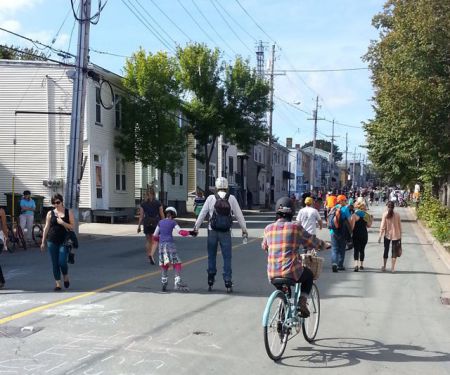K'JIPUKTUK (Halifax) - When Jared Kolb, executive director of the bike advocacy group Cycle Toronto, asked a crowd of nearly 500 people by a show of hands if they would like to see protected bike lanes in Halifax, there wasn’t an arm kept lowered in the room.
“Nothing compares to the joy of riding a bike,” he told a packed auditorium at Dalhousie University Thursday evening.
Kolb presented a lecture titled, Politics of the Right of Way, discussing the role of grassroots bike activism in pressuring municipal leaders to make policy changes that promote healthier, more accessible modes of urban transportation.
“Cycling safety is not a left or right issue,” he said, saying that safety is central to the health and well-being of citizens.
“Community organizing is the difference. We have to organize if we want to make change.”
His lecture, organized by the university's College of Sustainability, came just few weeks shy of when the city's first protected bike lane will be installed on campus, along University Avenue.
“Its really going to change the conversation about streets in Halifax,” Ben Wedge, co-chair of the Halifax Cycling Coalition, said afterwards.
Pushing for protected bike lanes is the coalition’s top priority, he said.
There are currently no designated bike lanes in Halifax, despite approved city plans to install a bike lane on Hollis Street that has been repeatedly delayed for years.
“The reason we need protected bike lanes is that they’re the only way we can bring out people of all ages and abilities and get them to start cycling,” Wedge said, citing a Portland study that found 62 per cent of people surveyed reported they wanted to bike more frequently, but felt unsafe.
Wedge believes better bike infrastructure would not only increase safety, but would see more women, children and seniors on bikes.
“It’s those people that we need biking,” he said. “We don’t need any more young white guys like me.”
But the only way to create sustainable change is through advocacy, Kolb told the crowd.
He explained the importance of creating compelling campaigns, such as the coalition’s On Tracks for 2020 initiative, which demands Halifax install 100km of protected bike lanes in the next six years.
“Successful advocacy rides on the back of great relationships," Kolb said. "Our advocates need to work closely with city staff, our advocates need to work with the business community."
But figuring out the reasons why people are choosing to cycle is the first step. He said that counter to what most people believe, the economic draw of riding a bike is a much stronger motivator than any environmental cause.
Kolb citied a recent study that said the annual cost of maintaining a bike is an average $308, compared to an annual cost $8,200 for vehicle maintenance.
The speed and convenience of cycling over driving was a close second he added, especially for distances under 5km in downtown centres



